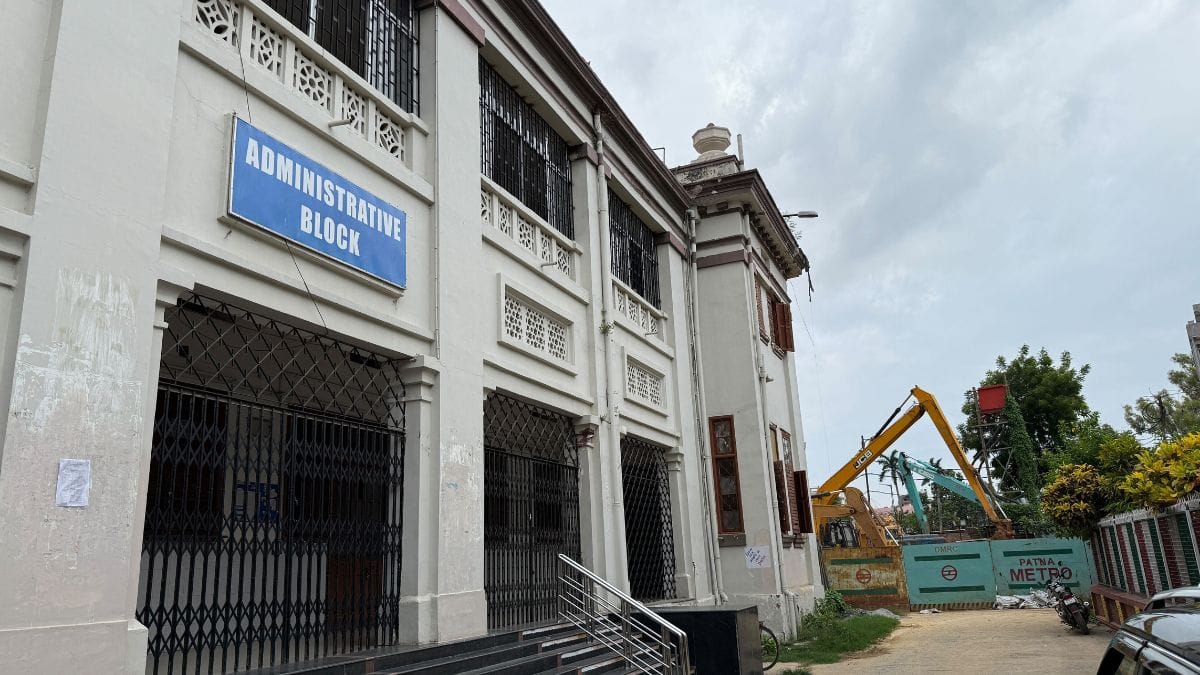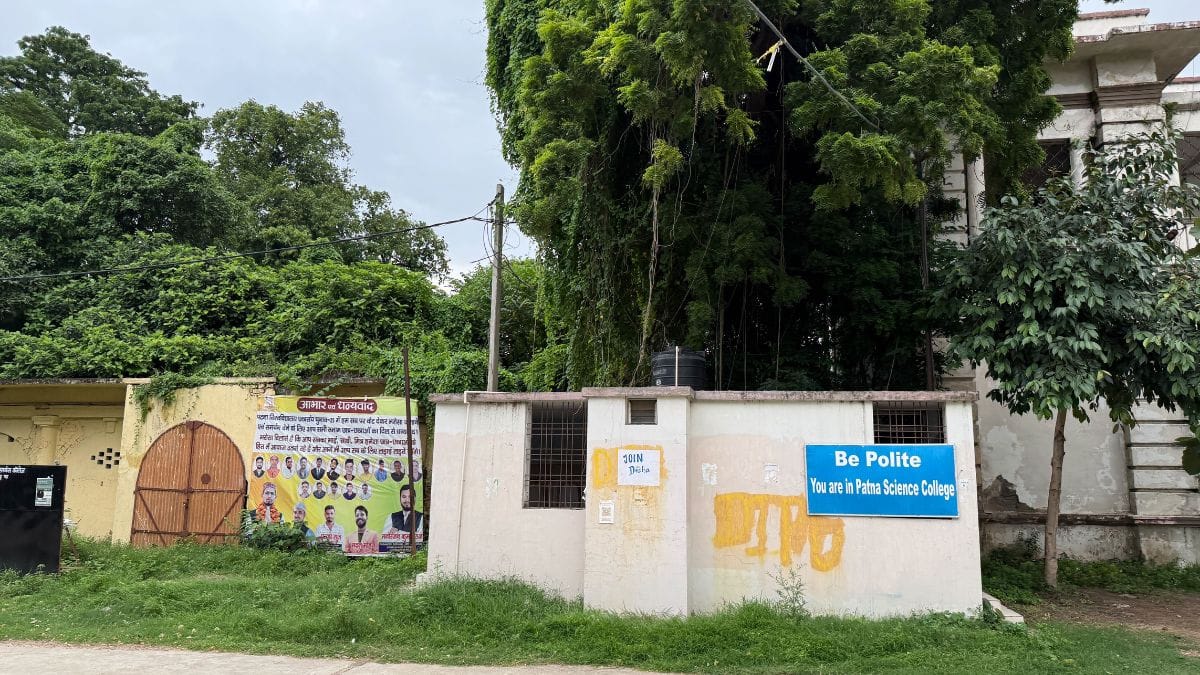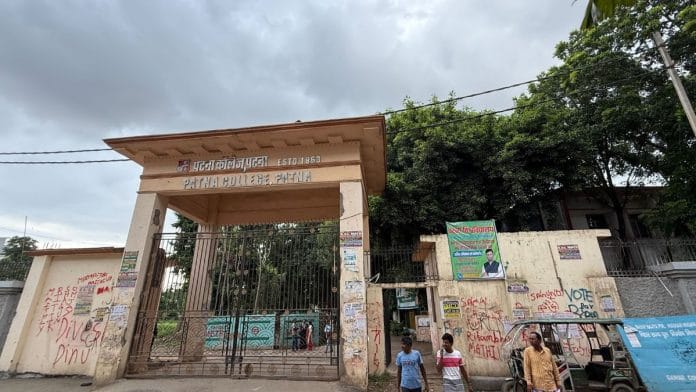Patna: Suheli Mehta has spent decades teaching Home Science at Patna University, holds a Ph.D. in Human Development, and was widely expected in academic circles to be appointed as the principal of the reputed Magadh Mahila College, where she is currently serving, and was once a student too. But on 2 July, an appointment lottery drawn at the Vice Chancellor’s office sealed her fate, sending her in shock. She was assigned to head a Commerce College—Vanijya Mahavidyalaya. An institution whose educational expertise do not exactly match Mehta’s discipline. She publicly declined to accept the post.
“I opposed the lottery system from the beginning. I even approached the Patna High Court against the lottery system, but the matter couldn’t progress as I was under peer pressure to withdraw my appeal,” Mehta told ThePrint. She was joined by two other professors, Shashi Bhushan and Shyamal Kishore, in her appeal.
The controversial decision was sanctioned by Governor and Chancellor Arif Mohammed Khan as part of a broader directive mandating that principal appointments across Bihar universities follow a lottery system. The Governor was quoted in media reports stating that the measure was introduced to curb nepotism, casteism, and corruption in academic postings and to promote fairness. Instead, the move has sparked widespread confusion and criticism.
Now, students and teachers at Bihar universities can’t wrap their heads around a system that is seemingly arbitrary and brings uncertainty to an already struggling higher education set up that is often mired in controversies of exam and result delays. That the universities aren’t the Governor’s personal lab is a feeling palpable across the academia and students. However, some also see it as a step toward establishing a progressive system that can shake things up in Bihar, where higher education has remained in a state of comatose since the late 1980s.
“It’s unfortunate for our education system that the principal’s post is now tied to a lottery,” Mehta added.

In March, results for selected candidates were announced. The following month, the education department approved the list and forwarded it to the Governor. On 16 May, the Governor, through his Principal Secretary, sent a letter to all 13 universities in Bihar detailing a new procedure—a lottery system to appoint principals from the selected pool.
Professor Mehta, along with Professors Shashi Bhushan and Shyamal Kishore, decided to challenge the move in the Patna High Court.
“We thought the High Court might impose a stay,” Mehta said.
“The Governor was asked to respond by 16 June, but there was no reply. We checked, and he was in Delhi at the time, and we couldn’t meet him in person. The next hearing was scheduled for 7 July.”
Meanwhile, one of the representatives, Professor and MLC Nawal Kishore Yadav, met with the Governor on behalf of the selected professors.
“He was adamant,” Yadav told ThePrint. “He said if professors could approach the High Court, he would take it to the Supreme Court. He claimed to have received numerous complaints about bribery and corruption in principal appointments, and introduced the lottery system to curb it,” Yadav added. After this meeting, Mehta and her colleagues silently chose to withdraw their petition.
“You certainly can’t go against the system,” Mehta said. She decided to participate in the lottery panel. On the 2 July, around 11:30 am at the VC’s office, four professors gathered.
Under the new system, principal appointments will be made across 13 universities in Bihar, filling 115 positions. The lottery drawn for five colleges under Patna University is now set to be similarly applied across the remaining institutions in the state.
“We are not doubting the intention of this move, but we have a standard merit cum choice preoccudre in place which is technical and fair also,” said Mehta adding that when she was given a different choice she felt like being given an allied service through UPSC while she had opted for the IAS and also topped the exam.
Under the new system, principal appointments will be made across 13 universities in Bihar, filling 115 positions. The lottery drawn for five colleges under Patna University is now set to be similarly applied across the remaining institutions in the state.
“By extending its reach from faculty appointments and transfers to principal postings, Raj Bhavan has virtually reduced the Vice Chancellor to a head clerk of the university—a mere ‘bada babu,” said Professor Tarun Kumar, former principal of Patna College and former dean of the Hindi department at Patna University.
He further asked, “Corruption is deeply entrenched in institutions like Raj Bhavan and the Vidhan Sabha, but that doesn’t mean we start resolving it through lottery systems. Should these institutions adopt a draw of lots for their appointments too?”
ThePrint tried to contact the Governor through his Principal Secretary Robert L. Chongthu via email and messages but received no response.
Also read: Does Kashmir’s history begin and end with Islam? First excavation to explore the unknown
Shockwaves, anger
For decades, Bihar’s universities have struggled to retain both their relevance and institutional autonomy. Graduation timelines, ideally three years at the national level, are frequently stretched to five or even six years. Students across universities in the state often find themselves at the centre of memes.
“We wait endlessly for announcements of papers, for results. It’s a paralysed system,” said Nitin Kumar, a student at Patna University.
The recent move to appoint principals via lottery, placing them outside their area of expertise, has only deepened the sense of dysfunction at the ground.
Students like Nitin acknowledged that corruption and casteism are deeply embedded in states institutions. But the randomness of such appointments only adds to the prevailing chaos.
Soumya Srivastava, an elected member of the student union, echoed the same concerns.
“If appointees lack the expertise to lead subject-specific or gender-specific colleges, why are they being chosen randomly?” she asked.
Patna University includes colleges dedicated to science, law, and commerce streams. Magadh Mahila College, for instance, has never had a male principal, except for one brief episode, when Professor Umesh Mishra served in a temporary crisis for three or four days; it has always been led by women.
If appointees lack the expertise to lead subject-specific or gender-specific colleges, why are they being chosen randomly, asked Soumya Srivastava, an elected member of the student union
Also read: Gurugram or Kudagram? Elites are furious over the garbage emergency
The pilot
In March this year, the Bihar State University Service Commission (BSUSC) shortlisted a panel of around 115 professors, deemed eligible to become principals in colleges across the state.
There was excitement, and the academic circles buzzed with anticipation. The top-ranking candidates were anticipating stepping into leadership roles at institutions they had long served, and institutions where many had once been students.
Among them was Suheli Mehta, who topped the panel’s rankings. Many in the state’s academic circles saw her potential appointment as a natural progression of merit and continuity in her long professorial journey. She, too, had dreamt of leading the very college where she had spent much of her career.
But on 2 July, that expectation took a surprising turn when her selection, along with four others, wasn’t done by a panel of experts but by a lucky draw.
Traditionally, appointments in Bihar’s higher education followed a structured protocol– university commission select candidates based on exams, interviews, the Bihar government grants approvals, and the Vice Chancellor holds authority to appoint assistant professors and principals. Additionally, the Governor’s office would nominate one representative to oversee the process.
Under the supervision of Raj Bhavan, and with the proceedings recorded on video, a three-member committee, comprising Patna University’s Vice Chancellor Ajay Kumar Singh, Registrar Shalini, and the Chancellor’s representative Rahmat Jahan, gathered in the university premises to pick chits from a box.
With each chit they drew, the fate of the shortlisted candidates was sealed to a college they had never imagined being appointed to.
For faculty members in various colleges across Bihar, the shockwave isn’t just about where Mehta landed, but about the precedent the new system will set. The atmosphere is tense in the faculty rooms, as everyone waits for the next round of appointments. The pairvi (recommendation) may not work for some.
Traditionally, appointments in Bihar’s higher education followed a structured protocol– university commission select candidates based on exams, interviews, the Bihar government grants approvals, and the Vice Chancellor holds authority to appoint assistant professors and principals. Additionally, the Governor’s office would nominate one representative to oversee the process.
But this older system was plagued with allegations of corruption.
Also read: Patna Planetarium is on top of its game today. An IAS officer sparked the transformation
What it does to Patna University colleges
While the new lottery-based policy affects hundreds of colleges across Bihar, it’s the appointment of principals to five prestigious colleges under Patna University that has caused the deepest unrest within the academic community.
“Patna College now stands as India’s oldest college. The rest, seven to eight institutions, have all been upgraded to universities,” said Professor Tarun Kumar, 65, former principal of Patna College and ex-dean of the Hindi department at Patna University.
He said that traditionally, only the senior-most professors from the social sciences or humanities were considered (by the university commission) for the principal’s post at Patna College, a convention upheld for over fifty years. “There was a brief lapse in the system at one point, but even then, the lottery was never considered a viable alternative,” he said.
This time, that long-standing tradition was abruptly interrupted. Anil Kumar, a chemistry professor from Uttar Pradesh, was selected through the lottery to head Patna College, established in 1863.
His appointment marks the first time a faculty member from the sciences has led this historically arts-focused institution.
Nagendra Prasad Verma, a history lecturer from Jai Prakash University in Chapra, was appointed principal of Magadh Mahila College, where Professor Mehta wanted to lead.

Alka Yadav, a home science faculty member from Babasaheb Bhimrao Ambedkar Bihar University, was appointed as the first woman principal of Patna Science College in its nearly hundred years of history.
For nearly fifteen years, after 2009, Patna University operated in a state of suspended tradition. Regular commission-recommended appointments were either derailed by administrative roadblocks or unresolved legal battles.
In this vacuum, some of the university’s oldest colleges, including BN College, were led by interim principals who never received formal confirmation. BN College, for instance, continued under the leadership of Raj Kishor Prasad, who is its long-serving principal.
This month’s appointments end the prolonged indefinite interim leadership.
Also read: The politicians who built Delhi’s Wazirpur slum. Its jhuggi to JCB story
Beyond Bihar
Dinesh Singh, former Vice Chancellor of Delhi University, said that the challenge of appointing capable college leaders runs far deeper and stretches far beyond Bihar.
“The problems afflicting university appointments aren’t unique to Bihar—I’ve seen them play out across many institutions nationwide,” he said.
Across India, principal appointments traditionally followed a two-step process. First, an extensive selection committee shortlists eligible candidates. Then, in a second round led by the university’s Vice Chancellor, a panel of three is finalized.
“A college only shines when it’s headed by the right person,” he stressed that a college’s integrity hinges on its leadership.
While the lottery system may curb corruption, lobbying, and external pressure, he cautioned, “It doesn’t guarantee that a strong academic leader will emerge from the draw.”
Singh called on the Governor to consider more robust alternatives—perhaps by nominating trusted academic experts across the country to form independent panels and recommend suitable appointments.
Another former vice chancellor, speaking off the record, added that under normal circumstances, appointment recommendations are often communicated quietly through confidential letters, from judges to politicians.
“We will have to wait to see if this new system works for Bihar or not,” he added.
(Edited by Anurag Chaubey)






